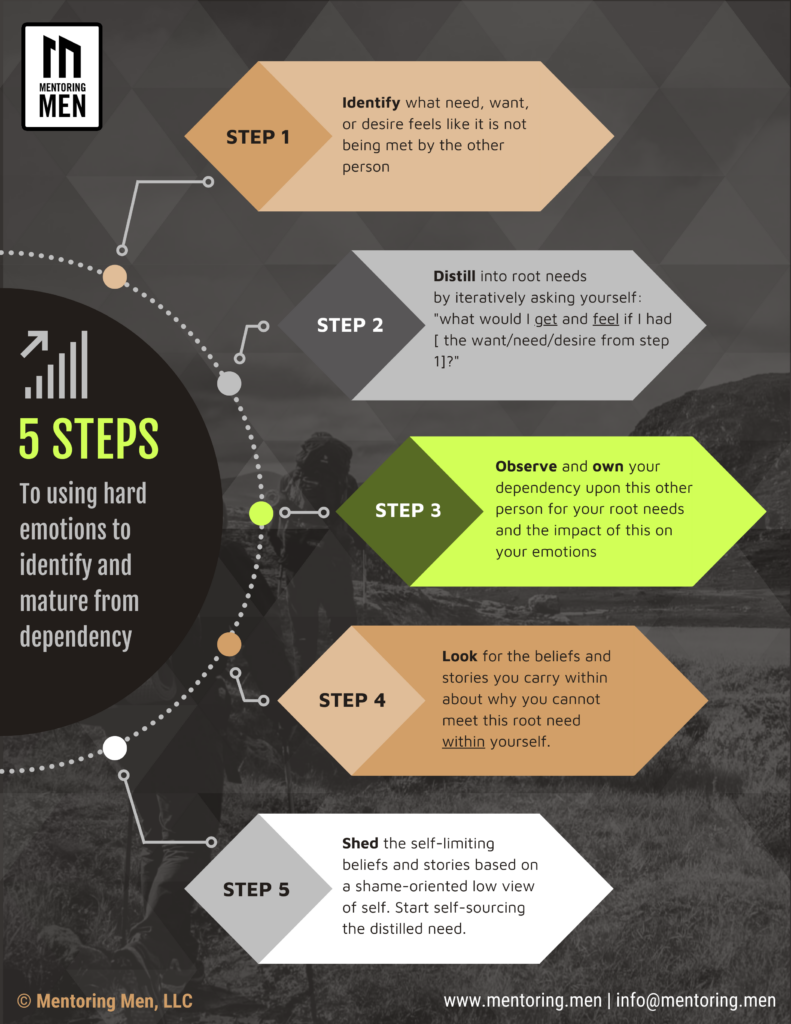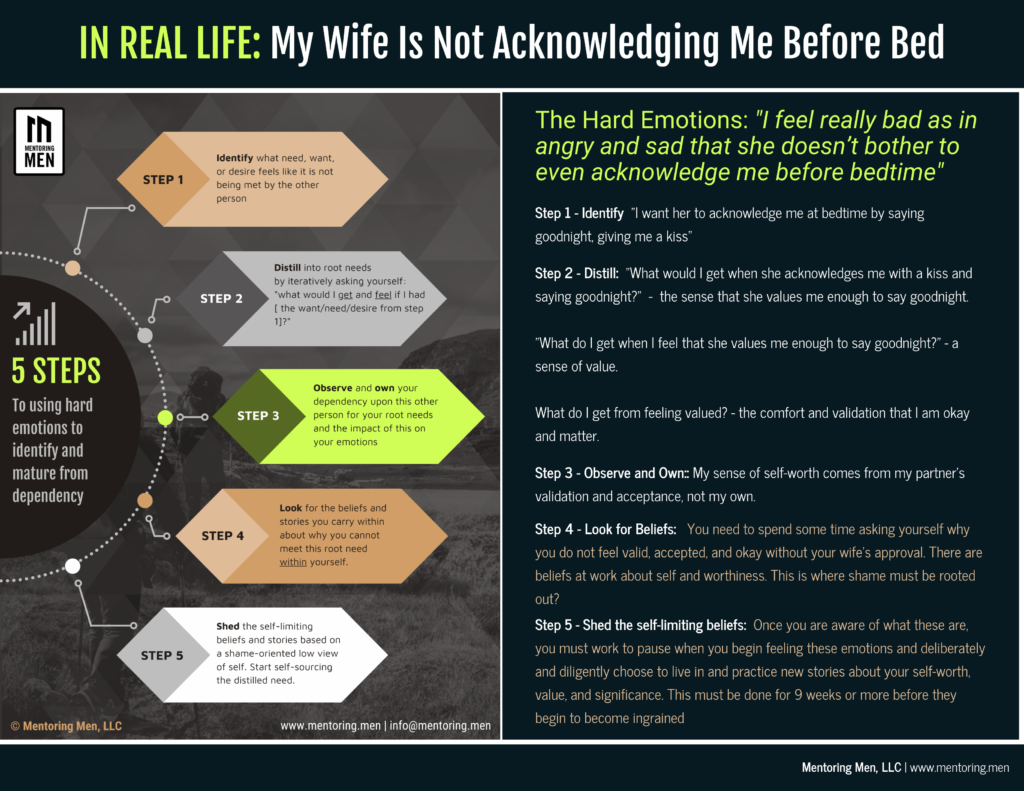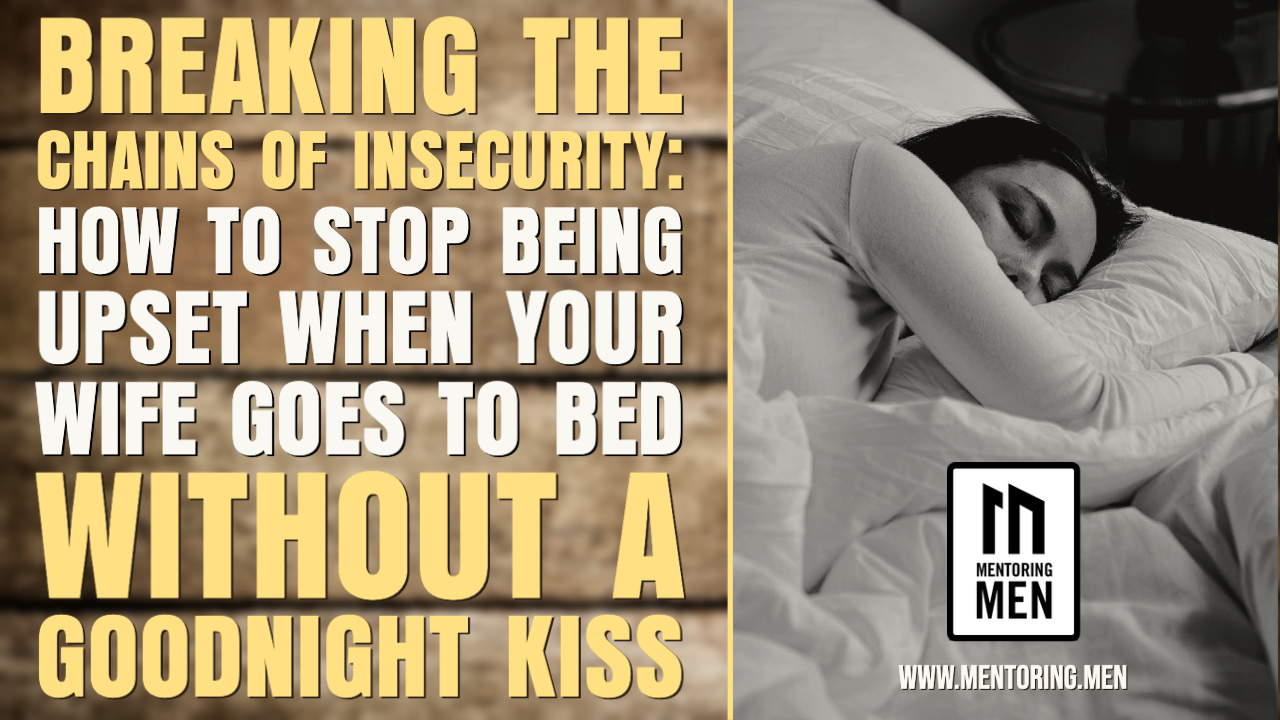Note: We're an organization dedicated to transforming, improving, and empowering the lives of men (and those around them), so this article will focus on men, even though we believe these principles transcend masculinity and the human experience.
Recently, we got this letter from a struggling husband who was feeling some emotional pain from his wife’s bedtime routine:
I’m emailing you in real time as I’m having a pretty painful moment late tonight.
I am emailing on this as this is an area that comes up a lot that I still struggle with a decent amount.
Basically we’ve had a good day overall as a family. Spent most of the day out celebrating some special events back to back.
We got home and as usual, we said goodnight to our kids. When Jackie puts them to bed, she usually spends a decent amount of time doing this and says goodnight and such.
The usual evening pattern afterwards is what I sometimes struggle with. While I am working on acceptance, I still get triggered seeing her on the sofa on her phone which is where she is pretty much most of the time after saying Goodnight to the kids. More often than not, she’s watching something or doing something. She’ll spend most of the time before bed in that position before going to bed. If I happen to go engage her in convo, she’ll listen and we talk but 90% of the time, that only happens if I initiate. She has rarely come to where I am and engaged me that way.
Partly because we are working on doing our own thing and learning to differentiate, we tend to spend time apart during the evening most evenings, where she is on the sofa and I am in another room.
Well, I find what sometimes happens (and has happened the last two nights) is that Jacki just gets up and goes straight to bed. The last two nights I find her in bed sleeping by the time I get there.
What kills me about this is I value goodnights between us which usually involve a kiss and a short routine. She generally has no problem with this goodnight ritual as long as we are in each other’s vicinity.
So when I have nights like tonight, I feel really bad as in angry and sad that she doesn’t bother to even acknowledge me before bedtime. Even to the point of feeling a lot of pain and even some tears/crying…
I have in recent past commented, “let me know when you are going to bed so we can say goodnight.”
But, since I am working on acceptance, I’ve decided I’m not going to chase her to make sure we say goodnight. After all, if this is something I value and if it’s not something she values enough to come find me and say goodnight (it’s a short walk to where I am), then I reason: I must simply grieve and accept this about my wife and learn to be okay with occasionally missing her for goodnights.
Yet,I find this is emotionally really hard for me to accept and honestly part of me is puzzled that she doesn’t consider this a valuable enough thing to do each night…but even as I say that, I can hear the self-coaching part of me saying “you have to accept her as she is and give her space to even not say goodnight to you and forget to do things you may value but she may not as much.”
Yet I was thinking about our call..if a kiss goodnight and a routine with her IS important to me and maybe not as much to her, then perhaps owning my desire would involve finding a way to ensure we do this each night. Don’t get me wrong..if it happens occasionally, it wouldn’t bother me.
It just bothers me more so now as this is the second night in a row and tends to happen more often if I spend more time in the other room prior to bedtime (as sometimes I don’t even realize she has gone to bed).
I welcome your thoughts/feedback here!
– Hank, the Hurting Husband
We receive letters like this all the time!
We routinely hear from men struggling like this all over the world. Men suffer far more pain than many realize.
Each man contacting us is experiencing unpleasant emotions like anger, frustration, resentment, bitterness, and disappointment toward their spouse. The situations are often different, but they all resemble one another, revealing the same basic patterns.
Believe it or not, it’s quite common in a long-term committed relationship like marriage for men and women to become increasingly frustrated with such emotions, despite the passage of time.
Before you’re tempted to make assumptions or judgments about the man in the above letter, you should know that we get letters like this from men from all walks of life.
Surgeons, Physicians, Attorneys, Law Enforcement, Military and Special Forces, elite athletes, highly successful entrepreneurs, high-profile community leaders, business owners, and even mental health professionals whose job is to speak to others about such pain!
Emotional pain is an indiscriminate scourge that doesn’t care how much money a man makes or how tough he is.
Hard emotions impact all men, and the solutions offered are ineffective for many
Many contemporary approaches to these kinds of hard emotions seek to resolve them by getting a man in his partner to air their mutual complaints and frustrations in front of a referee or moderator who will help them try to negotiate a truce or resolution.
This process seeks a settlement of sorts, in which partners wade through all their negative and painful emotions and conclude by either determining the relationship can’t be salvaged and must be dissolved (about half of marriages), or by getting each partner to commit to more efforts to understand and make one another happy and stop triggering them.
To many, this sounds reasonable, yet those who’ve been through it often return to feeling emotional pain and frustration again.
We find this approach to be ineffective in resolving marital conflicts.
We also witness how it often leads to continued dissatisfaction in couples and, eventually, the relationship’s demise.
Our clients tell us they prefer our guidance and that it’s been far more helpful than therapy and counseling
We’re not disparaging counseling or therapy. We believe they play a vital role in the lives of many.
However, many men we meet accomplish very little this way and may even worsen things.
With few exceptions, our clients with experience with these modalities routinely report that our care and guidance through their relationship turmoil have been far more helpful than other modalities they’ve experienced. As mentioned, we even provide some care for mental health practitioners.
Why is this?
Because we offer an approach to the men we work with that empowers them with understanding, personal agency, and complete ownership of their transformation process.
We offer men an approach that frees them from blaming themselves or their partners and teaches them that they can make progress without needing or waiting for their wives to change.
The root cause behind a man’s hard emotions: dependency
Many men respond with anger and irritation when we explain to them that their dependency is responsible for their hard feelings toward others.
It’s not an idea that most men find immediately palatable because it has immediate consequences for thought and deed. Every human being has a natural bent toward comfort, ease, and conservation.
Yet, most who will allow us to work through these concepts with them come to see just how reliable this concept is and how understanding this becomes the key to unlocking the deeply-satisfying, joyful life they’ve always dreamed of. A life filled with connection, intimacy, passion, and romance. We know the path to living that way and guide men daily!
Our approach helps a man discover how his hard emotions are “signals” that point to areas of external dependency that require his attention.
Left unchecked, dependency will begin to wreak havoc on adult human beings.
We show him how to use hard feelings as a means to locate and understand the root dependencies causing his emotional pain and suffering.
We then show him how to understand the thought patterns he’s acquired in his life (“stories”) that have compelled him toward dependency on others for his most fundamental needs.
These stories are ultimately what keep leading him to experience suffering. These stories must be transformed into better, life-giving stories, and specifically, stories free of dependency on external changes in others.
This approach substantially helps men live abundant lives because men that live with better stories live with more enjoyable emotions.
The relationship between dependency and idolatry
Despite not being specifically religious as an organization, we appreciate the word idolatry as an excellent description of what ultimately causes a man extreme emotional distress.
The dictionary defines idolatry as “immoderate attachment or devotion to something.”
We routinely discover that at the heart of a man’s relationship suffering is that he has immoderate attachment and devotion to something other than himself, most often, his romantic partner. He is idolatrous, though he rarely realizes this is the cause.
We call his behaviors idolatrous because his attachment and devotion to his partner and others exceed his attachment and devotion to himself.
As such, he creates dependencies upon his partner and others anywhere he has an insecurity within himself.
Everywhere men address their dependency, their emotional well-being improves.
Five Guiding Principles We Use To Help Men Overcome Idolatrous Dependency
Unpacking and addressing the dependency a man carries within is a delicate task that we guide men through over a loving, careful journey that spans six or more months. Nevertheless, there are some guiding principles we employ in that process.
Principle #1: The human journey is one of growing from dependency to self-reliance and interdependency.
All humans begin life as dependent infants.
We all must learn to slowly take on increasing responsibility and agency for our own lives. In the same way, we must replace dependency upon our parents for our physical well-being with self-reliance; we must also do in matters of emotional well-being.
Yet, for many men, this never happened. Instead, they merely transferred their dependency from one external source to another, from parental figures to their romantic partners, employers, neighbors, friends, religious leaders, and more.
We believe that maturity in men is the measure of how much dependency has been usurped by autonomy, agency, and self-reliance.
The less dependent a man is, the more mature he is and the more freedom, fullness, and vigor he experiences.
Principle #2: Men erect idols wherever and whenever they feel flaccid.
A man erects an idol in his life everywhere he is dependent upon something or someone outside of himself.
He does so in each area where he does not yet trust himself to meet his basic needs because he feels weak, infirm, unskilled, unqualified, or unworthy to do so.
Men look to others when looking at themselves doesn’t offer the confidence and certainty they long to experience.
Principle #3: Men are flaccid wherever and whenever they are ashamed and uncertain.
Maslow’s Hierarchy of Needs defines multiple needs layers: Physiological, Safety, Social, Ego, and Self-Actualization.
We do not deny that these are needs. We experience that men can learn to self-source these needs at each of these layers, thus eliminating their dependency upon someone else to do so.
Many men (and humans) can’t fathom that they can self-source needs like like acceptance, approval, appreciation, respect, value, worth, significance, meaning, and purpose. Yet, these are all possible to meet within the sanctity of a man’s soul.
If not, how can he receive from others what they can only receive from others? Where is the source if no one possesses these within themselves and yet needs them from one another?
Only when a man experiences shame and self-limiting beliefs about his inadequacy will he lack self-acceptance and self-trust.
It is these that prevent him from meeting his own needs.
Principle #4: Men have hard emotions toward non-compliant idols
A man experiences hard emotions toward his idol whenever his idols fail to meet his dependency-based needs, wants, or desires.
He thinks he “loves” his idols, but he’s playing a transactional game of giving homage to his idol in exchange for getting these needs met. He experiences anger, bitterness, contempt, malice, jealousy, rage, and more when his efforts to please and appease his idols do not work.
A man will resent and eventually come to hate the idol of his romantic partner when his partner neglects to provide anything he needs, wants, and desires that he feels he cannot or will not provide himself.
He sees himself as entitled to these because he’s paid homage to his idol by doing things like “going to work every day,” “putting a roof over her head,” “not calling her names,” and because “he’s never hit her, or cheated.”
It’s not just in romance!
A man will resent the idol of his employer when his employer neglects to acknowledge his strengths and contributions and provide him with an increased financial abundance that he feels he cannot or will not provide himself.
Such a man wants security, certainty, acknowledgment, prestige, and a sense of safety. Yet, he doesn’t know that he can self-source these, so he elevates his employer to the role of idol and pays homage to them in the form of time, labor, and diligence, hoping to receive these back. When the employer doesn’t give these, he experiences hard emotions like anger, rage, and jealousy over another person who received the idol’s favor.
He feels hard emotions because he sees himself as entitled to these blessings from the idol in exchange for paying homage by staying late, working hard, going the extra mile, and being attentive and pleasing.
Principle #5: Idols decrease where self-reliance and security increase
As a man overcomes his shame and inadequacy, ownership of himself and internal self-reliance for his needs begin to flourish. His dependencies begin to evaporate, and with them, the hard emotions he’s had toward his idols.
His life greatly improves as he regains the time, attention, energy, and focus he has been giving to trying to manipulate his idol into giving him his needs.
In the case of romantic relationships like marriage, when a man removes his dependency upon the idolized partner, his partner benefits too. They experience being taken off the idolatry pedestal as a release of pressure, expectations, and hostility.
They experience more freedom and acceptance. This is what begins to heal romantic relationships and marriages and leads toward wonderful connection and intimacy. As a partner experiences more freedom, acceptance, and less pressure, they are most often more drawn toward a man, relationally, romantically, and sexually.
He didn’t realize it, but his entitlement, need, and hard emotions created a barrier to what he longed to experience with his wife or partner.
We routinely find that as dependency wanes and self-reliance and security prevail, most men we encounter experience a partner moving closer to them.
They experience more kindness, connection, touch, warmth, intimacy, passion, and fun because their partner is finally free to do so without obligation.
Showing Men Their I.D.O.L.S
The image below highlights five conceptual steps we guide men through on their journey. These steps represent an understanding a man can repeatedly employ when hard emotions appear.

Rather than spell these out further, please watch this video where I walk Hank, the Hurting Husband, through some parts of this process in this video.
Here’s a summary of how this approach could work for the Hurting Husband whose wife goes to bed without saying good night:


Subscribe To Our Newsletter
Join our mailing list to receive the latest news and updates from our team.
You have Successfully Subscribed!